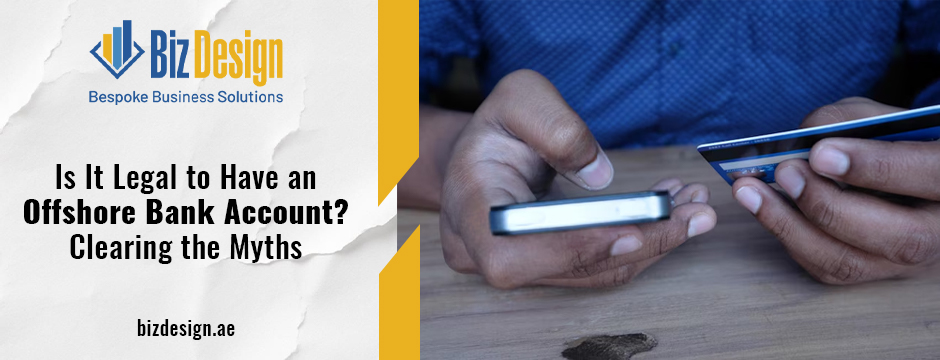
When most people hear the term’ offshore bank account,’ they often associate it with secrecy, tax evasion, or illegality. Hollywood and media headlines have reinforced that perception over the years. But is the truth different? Is an offshore bank account illegal?
In this article, we will examine the myths and provide a clear and concise definition of offshore banking, its legality, and how to apply it ethically.
What Is an Offshore Bank Account?
An offshore bank account is a bank account that you open in a different country from your native country. For example, if you live in the United States and open a bank account in Switzerland, the account is an offshore account.
People create offshore bank accounts for many different reasons:
- To keep their money safe in the event of economic instability in the home country
- To conduct international business
- To retain foreign exchange
- To benefit from better banking services
- For confidentiality and asset security
Just because a bank account is offshore doesn’t mean it’s illegal.
Is It Legal to Have an Offshore Bank Account?
Yes, it is legal to open an offshore bank account.
Most individuals believe that offshore banking is only for the ultra-rich or for criminals. But the reality is that millions of genuine people and business entities have offshore accounts regularly. In fact, many multinational companies have offshore accounts as part of their normal business practice.
But the bottom line is this: just because it is legal to have an offshore account, it must be utilized legally and declared legally in your own country.
Common Myths About Offshore Bank Accounts
Let’s clear some common myths and what the facts of the matter are.
Myth 1: Offshore accounts are always utilized to conceal money
Truth: While some people have abused offshore accounts to hide money, most use them legally. Offshore banks are regulated and must follow strict rules.
Myth 2: Only rich people can open offshore accounts
Truth: Many offshore banks allow regular individuals to open accounts. You don’t need millions—some banks accept deposits as low as $500 or $1,000.
Myth 3: Offshore banking is illegal
Truth: As we’ve mentioned, offshore banking is legal in most countries, including the U.S., Canada, the UK, Australia, and others, as long as it’s properly reported.
Myth 4: Offshore accounts don’t pay taxes
Truth: Offshore banks may not withhold taxes, but the account holder is still responsible for reporting income to their own tax authority.
Reporting Requirements
While keeping an offshore bank account is legal, not reporting it to your native country’s taxing authority can cause great problems.
A few of these problems are illustrated below:
United States (IRS)
You must report your foreign accounts if you are a U.S. citizen or resident and the total value of all the foreign accounts exceeds $10,000 at any time during the year. You must file:
- FBAR (Foreign Bank Account Report)
- Form 8938 (Statement of Specified Foreign Financial Assets)
- Non-reporting can cause high penalties and prosecution.
Other Countries
All developed countries also have the same reporting requirements. Some participate in the Common Reporting Standard (CRS), whereby the tax authorities in countries share financial information to detect tax evasion.
Always consult a local tax expert to ensure compliance with the laws.
Offshore Banking Benefits (When Done Legally)
An offshore company bank account in Dubai is not all about taxation. It can have real benefits, including:
- Diversification: You diversify your money across nations and currencies.
- Security: Others prefer secure offshore locations to de-risk political or economic dangers at home.
- Privacy: Offshore banks may offer extra financial privacy, but remain subject to global controls.
- Global Access: It’s easier for regular visitors, remote workers, or businesses to deal with payments around the world.
Risks and How to Stay Safe
Offshore banking is legal but involves some risks. Here’s how to remain safe:
1. Avoid using shady banks or tax havens
There are some secretive banks, but possibly without proper regulation. Use banks from countries with good financial regulations.
2. Always report your accounts
Never try to hide your offshore account from your taxing institution. It is your responsibility to report, not the bank’s.
3. Be aware of fees
Some offshore banks also charge extra fees than local banks. Read all carefully.
4. Be familiar with the laws in your nation
The laws are unique. Make sure you are complying with the rules within your nation and in the foreign country.
How to Open an Offshore Bank Account Legally
If you are thinking of opening an offshore account, the below is a general procedure:
- Choose a credible country – The best are Switzerland, Singapore, Cayman Islands, and the UAE.
- Pick a reliable bank – Look for banks with a good reputation and international services.
- Offer documents – Usually includes passport, proof of address, source of income, and banking history.
- Verify compliance – Make sure you understand your reporting and taxation obligations.
- Keep good records – Keep all records and records of transactions available for reporting.
Final Thoughts
An offshore bank account is not a secretive tool for wealth hiding. It’s a legitimate and useful banking tool used by numerous people for safety, anonymity, and global access.
But it has to be used responsibly. You should comply with your country’s law, report your accounts properly, and avoid any effort to hide cash or avoid taxes.
If used responsibly, offshore banking can be a smart part of your financial strategy.
At Biz Design, we help you open and manage offshore bank accounts legally and securely, ensuring full compliance, financial privacy, and global access for your business success.






